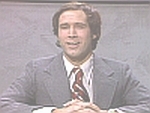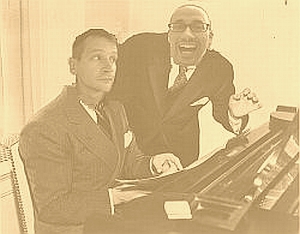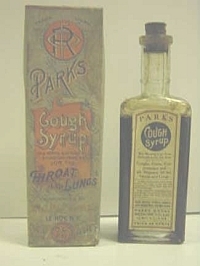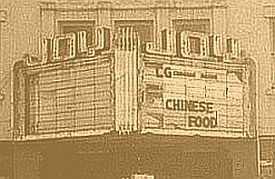persiflage
edifying but in a counter-productive way
October 8th, 2009I can't follow your advice, my dear, I can't begin to. For there are not so many lakes, a fellow can jump into. Lorenz Hart The civilized world accepts as unforgivable sin, any talking out loud with any librarian. Meredith Wilson Why be a great composer with your rent in arrears? Why be a major poet and you'll owe it for years? When crowds'll pay to giggle if you wiggle your ears. Be a clown. Cole Porter ClassifiedsFor sale: original Gershwin scores. The 7 to 1 shellacking his stickball team gave the kids from the next street over when he was nine, his 1060 rummy against Ira and many others. Inquire about prices. Box 18.
Listen to Part Twenty-Six of The Mystery of the Lost Lenore Click on the picture. (2:26) ArchivesLinks |
Great Song Writing Duos Forman and Hobbes The Men There really was a Golden Age of the Broadway musical theatre and many people are familiar with some of its greater practitioners, Lerner and Loewe, Rodgers and Hart, Rodgers and Hammerstein, George and Ira Gershwin et al. but fewer people are cognizant of the work of Ford Forman and Bob Hobbes. Robert Terwilliger Hobbes was a classically trained composer born just outside Muncie, Indiana (a mere seventeen feet outside the city limits)in 1900. In his youth Hobbes was a bit of a wanderer, spending some time in Vienna studying with Schoenberg (Raymond, Arnold's less talented brother) and in Paris, where he shared a bicycle with Satie until they quarrelled over proper tire inflation. Hobbes then drifted south into Spain where he wrote a series of marching songs for the POUM during the Civil War there. None of these were used because of their bizarre instrumentation (tea kettle, horse whip and fake moustache). In 1938 he found himself in New York (the last place he looked). Ford Ford Forman (originally Ford Ford Ford) was a well-known (but not liked) writer of mimes. He had started out as a door to door door salesman. He had little formal education but spent an enormous amount of time in the library, some of it reading books. After a 1936 arrest for vagrancy Forman wrote a short story about prison "Is Someone Behind Me?" which was turned into a play by the theatre impressario Florence Ziegfield (sister of Florence). The play was not a success. By 1938 Forman was living in flophouses in New York writing mimes and making a meagre living as a pencil repairman. One night in 1938 Forman and Hobbes were both in attendance for a party at the Stork Club (not the one made famous by Walter Winchell but the club established in Queens for actual stork fanciers which both men were). At some point in the evening the two men decided to collaborate on a piece of musical theatre.  |
The Musicals Forman and Hobbes' first collaboration, Baby Takes a Holiday, was a near miss. It had some good songs, "Pack a Lot of Diapers, Momma" and the very hummable "Hmmm Hmmm Hmmm" but theatre-goers were unconvinced by its central concept of a baby beating Lindbergh across the Atlantic in a plane she made herself. Also Ethel Merman, although a great singer, was not believable as a six month old. Forman was depressed by the lacklustre reception of Baby and went on what would be the first of a long series of cough medicine sprees. He would disappear for days at a time and then, ironically, show up witha bad cough. Hobbes was more sanguine about it. He was often seen at that time in the fashionable nightclubs of Manhattan in the company of chorus girls. In 1944 Forman and Hobbes re-united to pen Small Potatoes, a light hearted romp through Depression era Idaho. Despite a stellar cast featuring Skip Wanamaker, the inimitable Nancy Durable, the one-legged dancing sensation, Woddy Conron and the always excellent Grace Fungeby as Mrs. Peapod, the show ran for only three weeks. One borderline hit "A Turnip's A Tuber Too" still gets some airplay on nostalgia radio. The reviews of the show were a disappointment to both men. Forman went on a binge and was eventually arrested for cruelty to animals after he tried, unsuccessfully whilst in a syrup induced stupor, to give a collie a haircut. Hobbes handled it somewhat better but he did however develop the disturbing habit of claiming to have written songs that he did not. He would sit in the audience of musicals and in nightclubs and as a number was being performed he would turn to whomever was nearby and say "I wrote that!" This led to a much publicized fight with Cole Porter in which Hobbes overturned Porter's wheelchair outside 21. F& H's final attempt was 1952's terrible Chinese Food an extended (it was over four hours) musical paen to their favorite style of cooking. All the songs had numbers instead of names and one hour after seeing the production one had the urge never to see any musical theatre ever again.  After Chinese Food tanked, Forman went on a cough syrup binge the likes of which no one had ever seen. When he finally passed away (he was bitten by an rabid squirrel in 1955), Buckley's actually had to let some staff go. Bob Hobbes, however, flourished once his partnership with Forman ended. He wrote a series of advertising jingles that made him a very wealthy man. As a result he was able to start a very large stork farm in Florida. He lived to be 98 years old, finally passing in 1998 (obviously). He was believed to have fathered 107 illegitimate children. An interesting and little known tale from the Golden Age of Broadway. Hugh Briss |